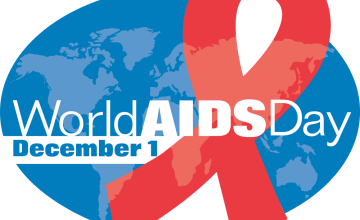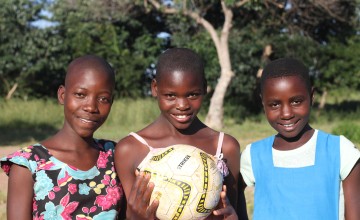
Read our 2023 annual report

Knowledge Hub
Is HIV off topic on the global health agenda?

This World AIDS Day, Breda Gahan - Concern’s Global Health & HIV and AIDS Programme Adviser and Tsion Fikre – Concern’s Health and HIV Research Intern discuss the position of HIV on the global health agenda and how Concern Worldwide is incorporating HIV and AIDS responses into its programmes.
Conversation is still needed
A topic dies down either because something bigger has surfaced or because it has been resolved. In the health care arena, it seems as if this is also the case. The struggle with HIV and AIDS is still present but the conversation has died down.
Access to treatment is still limited to only 53% of people globally living with HIV. Marginalised groups such as women, people with disability, and LGBTI trail behind statistically in terms of being able to access easily available health services. The stigma alongside HIV and AIDS still continues to greatly affect the LGTBI community in countries that have discriminatory laws and homophobic environments making it even more difficult, especially for men, to access HIV services.
The 1966 International Covenant on Economic, Social and Cultural Rights declares the right to health as the right for everyone to enjoy the highest attainable standard of physical and mental health. This includes the right to the prevention and treatment of ill health (including HIV and AIDS), to be autonomous about one’s health and to be treated with respect, dignity and without discrimination. These rights however, are difficult to enforce without a human rights based health system.
New threats emerging
Now, new threats within the realm of the HIV and AIDS epidemic are arising. Resistance to first-line anti-retrovirals means there is a need to transition into second generation treatment and ensure that all people who should be on HIV treatment are receiving it.
The Sustainable Development Goals dictate the hope for complete good health and well-being, one of the targets being to end the epidemic of AIDS by 2030. For this to be plausible, the services that are needed must be available globally for every community infected and affected by HIV and AIDS.
Concern’s Response
Concern has been both actively and indirectly working on the prevention, testing and treatment of HIV and AIDS with Ministries of Heath and local partners in several countries over the years. As of 2016, a lot of work on prevention, awareness and HIV education has been facilitated with target populations to reduce their HIV risk and vulnerability. A programme set up in Bangladesh for last year’s World AIDS Day (WAD) organised orientation sessions on HIV transmission for 1284 pavement and squatter dwellers in urban Dhaka. Government and NGO’s observing a national WAD helped to create a positive impact on the programme, and 53.2% of survey respondents – pavement and squatter dwellers- said they would be able to correctly identify ways of preventing the transmission of HIV. This represented an increase of 7.9% from the previous year’s result.
Along with this, the Char integrated programme, (as part of a support programme to reduce inequality in allocation of resources) engaged School Management Committees (SMCs), Parents Teacher Associations (PTAs), Community Clinic Management Groups (CCMGs), religious leaders and local elites to join the conversation on the prevention of sexual transmission of HIV.
This has proven to be effective as women aged 15-49 expressed a higher understanding of transmission, an increase of 7.6 since 2015. Similarly, in the Haor area the percentage of men and women aged 15-49 who correctly identified ways of preventing sexual transmission of HIV and who reject common misconceptions about transmission has increased by 20.2% since 2015.
In the Democratic Republic of Congo (DRC), as part of the risk and vulnerability reduction programme, messages on the transmission and prevention of sexually transmitted diseases including HIV was integrated into their hygiene promotion work focusing on handwashing, safe water handling practices and safe waste disposal. In Sudan the nutrition team conducted a HIV and AIDS campaign through local seminars and plays to depict ways of transmitting HIV and preventing it. HIV was mainstreamed into all activities in Liberia, providing information on the virus, how people get infected, HIV prevention methods, getting tested and accessing counselling, with denial and stigma issues included during regular programme trainings.
Engaging with the youth
Concern’s Skillz programme in partnership with Grassroot Soccer launched in Malawi in 2013 and is a demonstration of best practices in terms of targeting and engaging with the youth. The programme educates and inspires young people in the fight against HIV by focusing on sexual and reproductive health information and needs.

This is a fun and interactive HIV prevention and life skills curriculum for boys and girls. At the end of the course, they can access mobile HIV counselling and testing through a partnership with the District Health Office.
Going Forward
Concern plans to continue working with Sierra Leone, Ethiopia and Sudan teams to tackle the HIV and AIDS epidemic as an integrated response within health programmes funded by Irish Aid and the European Union.
The structural interventions that address discrimination, the marginalisation of certain groups, policy making and advocacy are crucial steps to address the ongoing problem of increasing complacency, as are the healh interventions that come with HIV prevention, testing and treatment.
The vow to ‘leave no one behind’ requires the recognition that people are entitled to their health and HIV protection, and to every resource that would aid them to achieve it.
Read more


